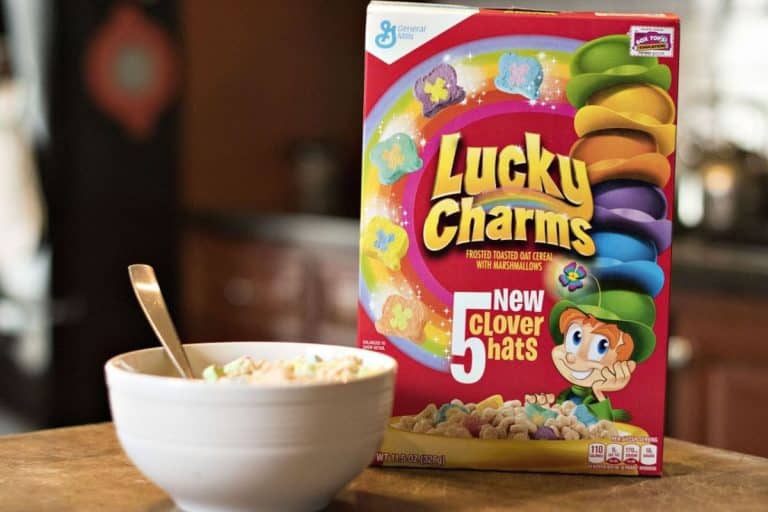Are Frosted Flakes your best breakfast cereal, and do you wish to know the amount of sugar in Kellogg’s Frosted Flakes? This article shows you everything you need to know about sugar in frosted flakes to know if they’re a good choice for your health.
Quick Preview show
Kellogg’s surely knows how to get the family together for a delicious breakfast cereal. Frosted Flakes is a Kellogg’s cereal brand that has existed since 1952.
The cereal contains cornmeal, which gives it a satisfying crunch and sugary taste. One significant benefits of Kellogg’s are that while you can complement it with milk for breakfast, it’s also sweeter when enjoyed on its own.
If you want a nutritious and time-saving sugary breakfast cereal, you should consider Kellogg’s Frosted Flakes. It’s a great treat for children worldwide.
Outside its function as a breakfast cereal, Kellogg’s Frosted Flakes can also be used as baking ingredients for products like bars and cookies.
Over time, I noticed that people question the amount of sugar in Kellogg’s Frosted Flakes. This prompted me to do research about this. Below is the amount of sugar in Kellogg’s Frosted Flakes.
How Much Sugar in Kellogg’s Frosted Flakes?
Kellogg’s Frosted Flakes doesn’t contain a high amount of sugar compared to other sugary cereals. According to the company’s nutrition information, it has approximately 12 grams of sugar per 1-cup serving size.
This amount of sugar greatly complies with the recommended daily sugar consumption given by The American Heart Association.
The American Heart Association recommends that men limit their added sugar intake to 36 grams. Women are recommended to consume nothing more than 25 grams of sugar.
Also, children aren’t left out of the recommendation. The daily sugar consumption for children between 2 to 18 shouldn’t be approximately 25 grams.
Kellogg’s Frosted Flakes Nutrition Facts (Cereal)
Serving Size: 1 Cup (37g)
- Calories: 130
- Total Fat: 0 g
- Saturated Fat: 0 g
- Trans Fat: 0 g
- Polyunsaturated Fat: 0 g
- Monounsaturated Fat: 0 g
- Cholesterol: 0 mg
- Sodium: 190 mg
- Total Carbohydrate 33 g
- Dietary Fiber: 1 g
- Total Sugars: 12 g
- Protein: 2 g
- Vitamin D: 2 mcg
- Calcium: 0 mg
- Iron: 7.2 mg
- Potassium: 30 mg
Kellogg’s Frosted Flakes Ingredients
- Vitamin B12.
- Vitamin D3
- Folic Acid
- Vitamin B1 (thiamin hydrochloride)
- Vitamin B2 (riboflavin)
- Vitamin B6 (pyridoxine hydrochloride)
- Niacinamide
- Iron (ferric phosphate)
- Salt (less than 2%)
- Malt Flavor
- Sugar
- Milled Corn
Kellogg’s Frosted Flakes Sugar Vs. Similar Cereals
Now that we have examined the sugar content in Kellogg’s Frosted Flakes, it is important to compare this with similar cereals to see if Kellogg’s Frosted Flakes is the highest sugar-containing cereal.
| Cereal
| Serving Size | Total Sugar Content |
| Kellogg’s Frosted Flakes
| 1 cup | 12 grams |
| Honey Nut Cheerios
| 1 cup | 12 grams |
| Special K Red Berries
| 1 cup | 11 grams |
| Kellogg’s Crunchy Nut
| 1 cup | 11 grams |
| Cinnamon Toast Crunch
| 1 cup | 12 grams |
| Cap ‘n Crunch
| 1 cup | 17 grams |
| Honeycomb Cereal
| 1¾ cup | 13 grams |
Kellogg’s Frosted Flakes has a significantly similar sugar content to similar popular breakfast cereals like Honeycomb Cereal, Special K red Berries, Honey Nut Cheerios, or Kellogg’s Crunchy Nut.
Sugar in Frosted Flakes: What are the Effects of Excess Sugar?
Harvard Health Publishing lists some ‘sweet dangers’ of sugar. According to the Harvard Medical School publication, excess sugar is detrimental to our health. It can be a catalyst of diabetes, weight gain, fatty liver disease, inflammation, stroke, heart attack, and higher blood pressure.
1. Cancer
While there are many causes of cancer, sugar also plays a significant role. When consumed in excess, the body risks developing cancer symptoms.
A higher risk of developing cancer is also associated with a high-sugar diet since it may raise inflammation and lead to insulin resistance.
2. Type 2 Diabetes
There is no denying that excess sugar is the major catalyst of diabetes. Indirectly, the association between sugar intake and the accumulation of extra body fat raises the chance of developing diabetes. Overconsumption of sugar is linked to weight gain, the leading risk cause of diabetes.
3. Heart Disease
Blood pressure levels, blood sugar, high triglyceride, inflammation, and obesity are all known to result from consuming diets heavy in sugar, which puts one at a higher risk of developing cardiovascular disease.
4. Weight Gain
Weight gain is a significant cause of obesity. Research has shown that 2/3 of the United States population is overweight. In 2021, World Health Organization (WHO) released data about how 13 percent of the world’s adult population was obsessed.
Our World in Data verifies that over 39 percent of the adult population is overweight. One may wonder about the cause of this. It’s simple — excess sugar! Sugary beverages and food often contain fructose, a form of sugar.
Fructose provides a kind of appetite-stimulating effect far more than glucose — the predominant form of sugar in starchy food. Excess of this makes one stand the risk of being overweight. Limiting the amount of daily sugar or avoiding sugary food to stay healthy is important.
FAQs
- Are Frosted Flakes healthy for daily consumption?
It is not advisable to consume Frosted Flakes daily as they contain high sugar.
- What is the shelf life of Frosted Flakes?
Frosted Flakes can last for months. The best way to store Frosted Flakes is when kept in a cool and dry place. Ensure it is protected from direct sunlight. Also, always check the label for the expiry date to ensure it is still good for consumption.
- Is there a version of Frosted Flakes without sugar?
As of now, Frosted Flakes does not have any cereal without sugar.
Conclusion
Without a doubt, Kellogg’s Frosted Flakes is a delicious breakfast cereal. However, it is important to take note of its sugar content. Kellogg’s Frosted Flakes has 12 grams of sugar per 1 cup serving.
Cereals high in sugar should be consumed in moderation. Excess consumption of sugary food can result in several health problems like type 2 diabetes, weight gain, cancer, heart disease, and obesity.
Over 39 percent of the world’s adult population is overweight, and the major cause of this is the consumption of fatty food.
Sugar is usually converted to energy. When you consume excess sugar, it is usually stored in the fat cells. This can all accumulate inside the liver and eventually results in fatty liver disease.
This is why The American Heart Association recommends that adults limit their daily sugar consumption to 36 grams, while women and children (aged 2 to 18) limit theirs to 25 grams per day.
So, when next you want to consume sugary food, it is advisable to do so in moderation for your health.
![Does Sierra Mist Have Caffeine? [Know The Truth]](https://www.brandsprite.com/resources/wp-content/uploads/2022/12/does-sierra-mist-have-caffeine-768x401.png)


![Does Canada Dry Have Caffeine? [Answered]](https://www.brandsprite.com/resources/wp-content/plugins/wp-fastest-cache-premium/pro/images/blank.gif)